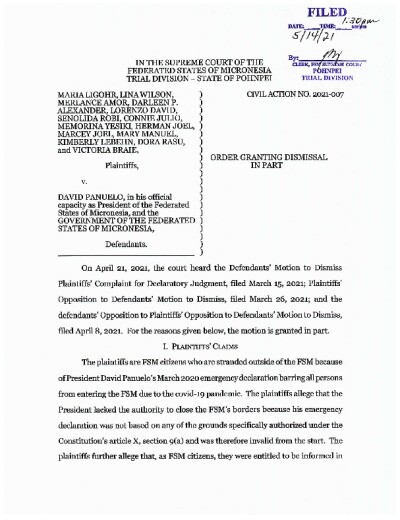
Date
Geographical Area
Pacific
Countries
Federated States of Micronesia
Keywords
Case Name
Ligohr et al v Government of the Federated States of Micronesia
Case Reference
Civil Action No. 2021-007
Name of Court
Supreme Court of the Federated States of Micronesia
Key Facts
In March 2020, the President of the Federated States of Micronesia (FSM) issued an emergency declaration barring all persons from entering the FSM due to the Covid-19 pandemic.
The plaintiffs in this case were citizens of the FSM who were unable to return home due to the declaration. They claimed that the President lacked the authority to close the borders as the emergency declaration was not based on any of the grounds authorised by article X, s.9(a), so was therefore invalid. They also claimed that there were less drastic alternative measures available for the President in order to preserve public peace, health, and safety. They sought a declaration stating that the declaration contravened the Constitution and was invalid ab initio, as well as stating that the President acted beyond his constitutional authority when he closed the borders.
The plaintiffs in this case were citizens of the FSM who were unable to return home due to the declaration. They claimed that the President lacked the authority to close the borders as the emergency declaration was not based on any of the grounds authorised by article X, s.9(a), so was therefore invalid. They also claimed that there were less drastic alternative measures available for the President in order to preserve public peace, health, and safety. They sought a declaration stating that the declaration contravened the Constitution and was invalid ab initio, as well as stating that the President acted beyond his constitutional authority when he closed the borders.
Decision and Reasoning
he Court first considered whether the President had the power to make such a declaration under the Constitution. Under s.9(a) of article X, the President may declare a state of emergency and issue decrees where it is required to “preserve public peace, health, or safety, at a time of extreme emergency caused by civil disturbance, natural disaster, or immediate threat of war, or insurrection. Citing Black’s Law Dictionary’s definition of ‘natural’ and ‘disaster’, as well as other court judgments from different jurisdictions, the Court concluded that the Covid-19 pandemic satisfied the definition of a natural disaster.
Furthermore, noting that there had not been any cases of Covid-19 in the FSM, the Court held that the threat of Covid-19’s imminent arrival in the FSM was a sufficient basis for the President to issue an emergency declaration. This was because they did not want to read the President’s emergency powers so narrowly that they only empowered the President to act when it was too late to stop the virus or to have any beneficial preventative effect.
The Court then considered whether there were less drastic measures available, as under the constitution, any Presidential decree under a declared state of emergency may impair a civil right to the extent actually required for the preservation of peace, health, or safety. Although the right to return to your country was not mentioned in the Constitution, the Court stated that it was an inherent right in the concept of citizenship or nationality and human rights. The Court held that there were other measures available.
Furthermore, noting that there had not been any cases of Covid-19 in the FSM, the Court held that the threat of Covid-19’s imminent arrival in the FSM was a sufficient basis for the President to issue an emergency declaration. This was because they did not want to read the President’s emergency powers so narrowly that they only empowered the President to act when it was too late to stop the virus or to have any beneficial preventative effect.
The Court then considered whether there were less drastic measures available, as under the constitution, any Presidential decree under a declared state of emergency may impair a civil right to the extent actually required for the preservation of peace, health, or safety. Although the right to return to your country was not mentioned in the Constitution, the Court stated that it was an inherent right in the concept of citizenship or nationality and human rights. The Court held that there were other measures available.
Outcome
The Court dismissed the plaintiff’s claim that the President lacked the authority to issue the March 2020 emergency declaration barring all persons from entering the FSM. However, did not dismiss the claim that less drastic measures could have been imposed to preserve health and safety in the FSM.
Link
Disclaimer
This case law summary was developed as part of the Disaster Law Database (DISLAW) project, and is not an official record of the case.
Document
Document